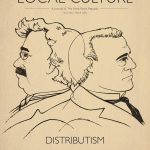“He is Britain’s Famous Shepherd-Author-Influencer. He Wants to Transform Farming to Save the Planet.” William Booth visits James Rebanks’s farm and puts his recent efforts to defend and practice regenerative farming in the context of the post-Brexit agricultural economy. If you haven’t already, it’s worth reading Rebanks’s books. Gracy Olmstead interviewed him about his latest book for FPR, and I wrote a long essay about Rebanks, Beatrix Potter, and the relationship between art and landscape in the last issue of Local Culture (back issues are still available to new subscribers for only $5).
“The Bitter Truth: There’s Still No Rhyme or Reason to COVID-19.” Charles C. W. Cooke has a refreshingly sane analysis of which policies help mitigate COVID-19: “There’s no rhyme or reason to this pandemic. Vaccines help a great deal. That much we know. Beyond that, though, the coverage of the virus has mostly been partisanship and witchcraft.”
“A Glimpse of Marriage on a Wedding Day.” John A. Cuddeback describes the conflicting emotions prompted by giving his daughter in marriage.
“China Slashes Kids’ Gaming Time to Just Three Hours a Week.” According to this report by Zheping Huang, the Chinese communist leadership seems pretty convinced that video games are bad for society: “The new rules underscore the extent to which Beijing is intent on curbing gaming addiction among youths and pushing its future workforce toward more productive pursuits. Earlier this month, state media published forceful critiques of the industry and at one point labeled games ‘spiritual opium.’”
“Desire Is the Human Condition.” Thomas J. Bevan reviews Luke Burgis’s Wanting: The Power of Mimetic Desire in Everyday Life and commends his Girardian analysis of contemporary culture.
“To Fit and to Fix.” I wrote an essay for Plough celebrating Alexander McCall Smith’s delightful fiction: “McCall Smith’s moral imagination honors those characters who have an awareness of the proper scale on which to exercise their affections and abilities, an intuitive sense for how disparate members of their places might fit together, and the patience and skill required to take up the practical work of fixing and restoring these places.”
“Joe Biden’s Critics Lost Afghanistan.” Ross Douthat was already cynical about the US presence in Afghanistan, but now “the withdrawal has made the case for an even deeper cynicism — about America’s capacities as a superpower, our mission in Afghanistan and the class of generals, officials, experts and politicos who sustained its generational extension.”
“Don’t Quit Twitter Yet. You Might Have a Moral Duty to Stay.” Tish Harrison Warren names a real and intractable problem: “Our implicit requirement of emerging leaders for copious social media engagement is like requiring all of America’s young cardiologists to take up smoking. The means necessary to have a public voice in our culture is precisely that which undoes the kind of deep thinking, nuance, creativity, humility, and compassion we desperately need from leaders of any sort.”
“The New Puritans.” Anne Applebaum, in a length Atlantic essay, grapples with “cancel culture” and the consequences of a censorious public square. She compares today’s online mobs to Hawthorne’s description of Puritan judgment in The Scarlet Letter. In this respect, her argument parallels the one Mark Mitchell makes about today’s “secularized Puritan moralism” in his recent book.
“What the Men Who Love My Boyfriend Taught Me About Social Hierarchy.” Gloria Liu, a transplant to Colorado, reflects on the sometimes odd ways in which we identify ourselves through how we name and narrate where we’re from: “Environment and geography shape our view of ourselves, as well as the groups we believe we belong to.” (Recommended by Elizabeth Stice.)
“The Best Books on The History of Science and Religion.” Charles J. Styles talks with Peter Harrison about five books that illuminate the fraught and often caricatured history of science and religion.
“Small Letters and Sparrows.” Mischa Willett recounts some of the miraculous experiences he’s had in taking at stab at some unanswerable questions: “how far beyond the probable does an event need to be before we consider it miraculous in the first place? Do miracles need to help someone in order to qualify, or just to be inexplicable otherwise? Do they need to follow a prayer? Those are real questions. I don’t know how to answer any of them, so I could use some help thinking about these things.”
“Stop Death Shaming.” Elizabeth Bruenig urges us to recover the lost arts of listening and persuasion: “the strange case of vaccine persuasion is just another entry in the annals of our disillusionment with our own liberal democracy. One receives the distinct impression from today’s discursive environment that persuasion in its traditional democratic form—wherein a great deal of value is placed upon shrewd and moving rhetoric that assumes listeners’ basic goodwill—is a useless venture, and that lower forms—insults, scolding, intra-group memeing, the dirty persuasion of disinformation campaigns—are all that’s left.”






